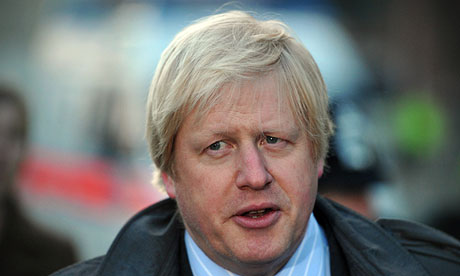
Boris Johnson has called on the government to drop its "hair shirt, Stafford Cripps" agenda as he outlined a seven-point growth plan for London involving building thousands of new homes and investment in major infrastructure projects.
Speaking at a British business lunch in Davos on Friday shortly after the release of figures showing the economy was again contracting, the mayor of London said it was time to "junk the rhetoric of austerity" and instead take steps to boost confidence and spending.
Johnson was critical of some of the gloomy talk coming out of the Bank of England and said the language of cuts was "not terribly useful in this sort of climate". He urged counter-cyclical measures that would work against the trends depressing activity.
"There is huge potential in the UK. It is important we have the spirit of confidence. Some of the mutterings from Threadneedle Street are not the stuff to give the troops."
He added: "We need investment in housing and transport, things that make a big difference."
Johnson said he supported George Osborne's deficit-reduction strategy, but said savings could be made in some parts of government that could be spent elsewhere on growth-friendly projects.
"But the hair shirt, Stafford Cripps agenda is not the way to get Britain moving again," he said. Cripps, the chancellor between 1947 and 1950, used taxes and rationing to limit consumption as the UK tried to rebuild its economy after the second world war.
Johnson said he would be shortly be publishing his seven-point vision for how the economy of London should look by 2020. "It is a manifesto for my friends at the Treasury who hold the purse strings," he said.
The mayor's new economic adviser, Gerard Lyons, has been working on the proposals, which Johnson said involved:
• Building hundreds of thousands of new homes
• Investing in road and rail infrastructure, including Thames crossings and a second Crossrail
• Boosting London's growth industries such as financial services and the startups clustered in Tech City (the technology hub centred around Old Street)
• Combating illiteracy and increasing the number of apprenticeships
• Maintaining low and stable tax rates
• Making London open to the rest of the world through a "sensible visa" policy and a new airport
• Changing the language of the economic debate.
The mayor was scathing about the lack of progress in providing London with extra airport capacity, saying: "I can't frankly understand the panda-like pace at which the government is addressing this problem."
He re-iterated his opposition to a third runway being built at Heathrow airport, saying extra demand would mean a fourth would be needed by the time the new capacity was ready by 2026 or 2028.
Johnson said this would be "an environmental catastrophe for London" and said development should take place either at Stansted airport or at one of two sites in the Thames estuary. "The proposition of expansion at Heathrow is a delusion and a disaster."

